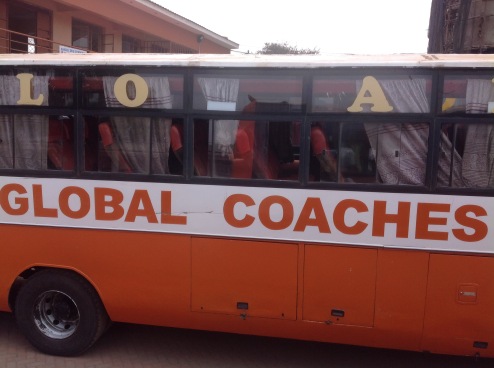I had spent a good number of years without using public buses to travel upcountry. My major beef with them has always been the time wasted at the bus terminal. So, when I had to embark on a journey to Mbarara recently, I decided to make inquiries around on the best form of public transport to use. Somehow, without collusion, all the people I talked to told me to use Global Coaches.
The D-Day came and I found myself at the bus terminal. While there, I found a number of Global buses parked. As I walked to the ticketing agent, a bus departed and by the time I got to the ticketing agent, another bus was already admitting passengers.

A Global Coach bus at the Kampala terminal
My first shocker was the amount I paid for the ticket. At UGX 15,000/= for a ticket to Mbarara, I could hardly believe my ears considering that fare to Masaka (a distance that is less than half that of Mbarara from Kampala) is in the environs of UGX 13,000/= when using the mini buses (coasters). Does it mean that the extra leg of the journey costs only UGX 2000/=?
The next surprise was the time I spent at the terminal. Within twenty minutes of paying, the bus was full and we were on our way to Mbarara. This is when I posed myself a question, Bakikola Batya? (How do they do it?)
Another comparison with my travels to Butaleja left me nearly in tears. A trip by commuter taxis to Busolwe in Butaleja district makes one part with at least UGX 15,000/= yet the distance from Kampala is much less than that of Mbarara.
That is when my mental bulb lit and I realised that the issue evolved around Scale of operation.
The commuter taxis and mini buses are usually owned by individuals who hardly have more than a handful. This implies that they have overhead costs that have to be swallowed up in the operations of their small fleets.
Matters are complicated that these cars of theirs ply different routes each for various reasons top among which is to spread where they tap money from.
I then looked at Global Coaches and immediately realised that with a large fleet of buses, they can then benefit from what the economists call economies of scale (the cost advantages a business obtains due to size, output or the size of operation). Let us assume the cost of operating a bus is UGX 500,000/= daily. As one increases the fleet to five buses, the unit cost of operating a single bus might drop to say UGX 400,000/= due to some of the costs that are fixed like Office rent. An increase of the fleet to 20 buses can easily push the operational daily cost per bus down to as low as UGX 250,000/= since the staff numbers may not necessarily increase that much when compared to a fleet of 10 buses. This translates into the price that the company can charge customers, hence explaining the unbelievable price of UGX 15,000/=.
Global buses depart every 20 to 30 minutes on average. These frequent departures ensure that getting transport on the Mbarara route is as easy as finding a commuter taxi to take you from the City Square to Ntinda. This assurance solves a lot of headaches. It allows one to start the day with work in office while resting assured that anytime they go to the terminal, the buses will be available. As a result, more customers are likely to use the service hence guaranteeing market.
Their choice to stick to the Kampala – Mbarara route has made the Global Coaches much more efficient than the competition. This kind of focus is needed.
What lessons did I learn from this?
-
Once your business has achieved a good footing, the next best thing to do is to scale it up in order to not only tap a bigger segment of the market but also benefit from the lower costs of operation presented.
-
Operating on a larger scale tends to give a business the ability to effectively address the pain points of customers. My pain point had always been that of delays at the bus terminals as well as the need to head very early (sometimes at 5am) to the bus terminal in order to be guaranteed of transport. Once, while in Apac, I had to board the bus (Acana Diru) at 3am just to be assured of a seat to Kampala.
-
Focusing on a market niche can pay off greatly if well done. Global Coaches has focused on Kampala – Mbarara route travellers.
I sincerely believe that this bus company has a great future if only the management can remain focused and avoid the pitfalls that have let down its predecessors in the business.
James Wire is a Small Business and Technology Consultant based in Kampala, Uganda
Follow @wirejames on Twitter.
Email lunghabo [at] gmail [dot] com


Nice write up
Did u know that they have the capacity and they always do it to send empty buses from one side with few clients to the opposite end which has an avalanche of travellers especially during festive seasons or elections
LikeLike
OK
LikeLike
OK
LikeLike
Awesome write-up James.
LikeLike
Thanks for taking time to read.
LikeLiked by 1 person
You have the right stuff in here, I am looking forward to working with you in this journey of blogging! All the best.
LikeLike
Thanks mate
LikeLike